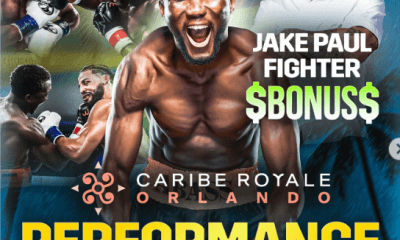Featured Articles
Anthony Joshua vs. NYC

If you were among those hurrying along Madison Avenue on Saturday afternoon, you might have seen him. He was laid out on the sidewalk under a propped sign, his head on a backpack. He was wearing one of those skinny suits that glint in the sunlight, the ones you usually see in threes on young professionals en route to a collaborative meeting or to entertain some client. This guy was one of them. He should have been up and at it, laughing with colleagues, sneaking looks at passing reflections. Something happened to him. His shoes were missing. Something happened and then something snapped and left him melting into the sidewalk, barefoot, his eyes closed as if to shut the world out. Madison Avenue gave him no more than a glance.
New York, New York, big city of dreams is also a destroyer. It got to a giant Saturday night. It got to him good.
Anthony Joshua was considering Frank Sinatra’s “The Theme from New York, New York” for his ring walk, which would have been the height of irony after that “if” in “if I can make it there” proved bigger than any billboard in Times Square. As it was, his supporters at the weigh-in had too much taste for one thing and not enough for another and shouted down Sinatra in favor of Neil Diamond. So while Joshua was in the dressing room at Madison Square Garden switching out of one groin protector and into another, the rest of us were subjected to a six-thousand-strong sing-along by beer-swilling Brits. “Sweet Caroline” never sounded so bad, so bad.
It was always a mistake to snub Sinatra. In 1969, Jimmy Roselli was a star. He was selling out the Copacabana and television was starting to notice. Then he turned down a request to sing at a charity chaired by Sinatra’s mother. A call was made and the next thing Roselli knew, he couldn’t get a gig or a record deal to save his life. He ended up selling his records out of his trunk on Mulberry Street and driving a delivery truck for Drake’s Coffee Cakes. You didn’t snub Sinatra. It might be worse to snub Sinatra’s ghost.
New York, New York got to Joshua early. Just before making his way to the ring, he hesitated and turned around to take a long swig of water, swishing it around as if he had dry mouth. When he climbed through the ropes and stood under the big lights he seemed to shrink. He was wide-eyed, looking around, chewing on his mouthpiece. He threw a couple of haphazard uppercuts. He took a deep breath. “That’s nerves,” someone said to no one in particular. One of his seconds placed one hand on the top of his head and massaged his neck with the other.
“Six feet six and weighing in officially at two-hundred forty-seven point eight pounds . . . from London England, the fighting pride of the United Kingdom; the reigning, defending, undefeated heavyweight champion of the world . . .” Joshua’s American debut was announced with all the ballyhoo befitting a monolith or a mythical hero. “Nice and relaxed Josh,” his cutman said as he lifted the water bottle to the hero’s lips. “You need a drink?”
Andy Ruiz Jr. walked to the ring wearing a gold and white robe. His pudgy face was a mask of innocence peering out from under a fur-lined hood that recalled those winter jackets kids wore in the 1970s. His goatee was the only indication that he’s old enough to drink. Unlike Joshua, Ruiz wasn’t announced so much as introduced as a personable fellow we should like to get to know. He’s from Imperial, California. He’s fighting for his Mexican heritage. There was a warning there, in that Mexican heritage. It was hidden under drapes of flab and random abscesses and stretch marks. Joshua, already over his head in another battle, couldn’t see the iron; the ethnic pride and unconquerable self-belief.
When the two moved into each other in the first round, it looked like a comedy sketch. Ruiz’s trunks didn’t quite make it over his belly button and he stood no higher than Joshua’s collarbone. Every time he moved, something jiggled. But he was moving fast, shooting jabs at Joshua’s sternum, dipping under big rights. Joshua’s mouth was soon hanging open. The big city was beating him. Ruiz was getting to him too.
In the second round, the 20-to-1 underdog stunned him with an overhand right and his leg jerked out behind him. He was too distracted to adjust to what was happening. Ruiz was disguising his counterattacks with jabs and forays from the perimeter and by punching with him. When caught, Ruiz came storming back with combinations that told of his own dreams. And he wasn’t intimidated by the godlike dimensions in front of him or honking and roaring outside. He wanted to be king of the hill, A-number-one, and this was how to do it. This is where to do it.
In the third round, Joshua landed an uppercut that would have decapitated a middleweight and followed it with a left hook. Ruiz went down. As he was going down, he never took his eyes off Joshua. “I had to get him back,” he said at the post-fight press conference. Scant seconds later Ruiz was up and barreling forward, his dreams barely dented. Joshua landed a right blast and Ruiz surged at him with a left hook and a winging right, then dipped under the incoming counter right and countered that with a left hook. It caught the giant on the temple and triggered the long descent into what was as self-conscious a knockdown as you’ll ever see. Joshua was smiling, embarrassed, but his legs, already shaky, could barely get him upright. Before the end of the round, Ruiz reversed the combination and sent him down again.
The end came in the seventh. Joshua, down for the fourth time in the fight and the second time in the round, got up and lurched from mid-ring to his corner. He could no longer feel his legs and needed support. He needed a drink. He spread his great arms on the top rope and leaned back just as he had during the introductions, a seemingly casual position that’s anything but. The referee saw his exhaustion and ended the fight.
—Ended the fights. Joshua went 0-2 Saturday night.
A panoramic scan of the crowd revealed jubilation and shock; hands aloft, over mouths, clutching hair, clenched at temples, high-fiving. Ruiz was at the center of it all, celebrating with shameless abandon. It was a joy to see; the fat kid we all knew in school (and some of us were) had bopped his way to the top of the heap. Joshua too was caught up in the moment. He took a giant’s step outside of his own ego and smiled down at his unexpected conqueror. Then he embraced him like a friend and a brother. “He is genuinely over the moon for Andy Ruiz,” said Eddie Hearn, “but he’ll be absolutely devastated when this kicks in.”
Will he leave his shoes at Madison Square Garden and melt away on Madison Ave? Not a chance. He’ll make a brand new start of it, in old York or thereabouts.
Check out more boxing news on video at The Boxing Channel
To comment on this story in The Fight Forum CLICK HERE
-

 Featured Articles4 weeks ago
Featured Articles4 weeks agoThe Hauser Report: Cinematic and Literary Notes
-

 Featured Articles4 weeks ago
Featured Articles4 weeks agoOscar Duarte and Regis Prograis Prevail on an Action-Packed Fight Card in Chicago
-

 Book Review3 weeks ago
Book Review3 weeks agoMark Kriegel’s New Book About Mike Tyson is a Must-Read
-

 Featured Articles2 weeks ago
Featured Articles2 weeks agoThe Hauser Report: Debunking Two Myths and Other Notes
-

 Featured Articles2 weeks ago
Featured Articles2 weeks agoMoses Itauma Continues his Rapid Rise; Steamrolls Dillian Whyte in Riyadh
-

 Featured Articles4 weeks ago
Featured Articles4 weeks agoRahaman Ali (1943-2025)
-

 Featured Articles4 weeks ago
Featured Articles4 weeks agoTop Rank Boxing is in Limbo, but that Hasn’t Benched Robert Garcia’s Up-and-Comers
-

 Featured Articles3 weeks ago
Featured Articles3 weeks agoKotari and Urakawa – Two Fatalities on the Same Card in Japan: Boxing’s Darkest Day




















